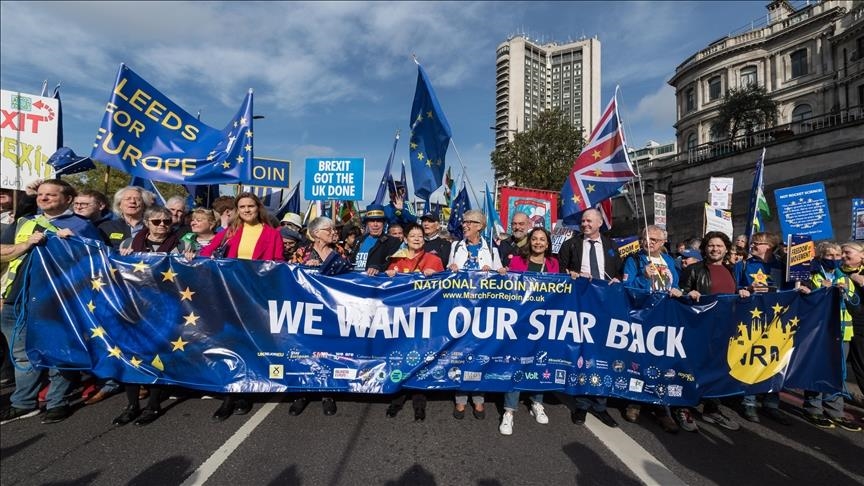
- Some 20,000 people recently marched in London to push for reversing course on Brexit
- Even worst critics cannot dispute Brexit's financial impact in terms of trade and growth and investment, academic Amelia Hadfield tells Anadolu
LONDON
Although there are no signs in British politics of reversing Brexit or an intention to rejoin the EU, most Britons still think it was wrong to leave the bloc and have a glimmer of hope that they might return one day.
Brexit is still a hot topic for Britain when it comes to any debate on soaring living costs and rights like free movement.
More than seven years since the Brexit referendum in the UK in June 2016, the percentage of Britons who want to rejoin the bloc has risen to the highest levels.
Some 58.2% of people in Britain would now vote to rejoin the EU, according to market research and data analytics firm YouGov’s Brexit tracker survey in June.
In addition, one of the recent “loud demands” to return to the EU came at a recent rally in central London, where more than 20,000 people marched with EU flags in hand.
Some of them claimed that rejoining the EU is somewhat “inevitable,” while others tended to be more cautious and said it is too good to be true.
Frances Simmons, a 70-year-old British citizen, told Anadolu that the gap between the very poor and the very rich has widened immeasurably since Brexit.
“We have lost the possibility of working and living in Europe easily,” she said.
“The cost of living here has risen dramatically, as the cost of our imported food. Stuff has just gone sky high.”
Simmons said the withdrawal from the EU’s Horizon Europe program, was another loss for Britain, although the country recently announced that it has reached a deal to rejoin the $102 billion research and innovation project.
Pulling out of the Erasmus student exchange program is also a “huge loss” for students, she added.
‘Impact on economy tragic’
Another anti-Brexiteer, Peter French, echoed Simmons’ view on the Erasmus program, saying the biggest impact of Brexit is on young people.
“It’s made their life so much smaller,” he said.
He added that a lot more people are questioning the decision now and may be reevaluating the choices they made.
“I think it’s (economic impact is) tragic. I think this government, the Conservative government, has got a lot to answer for because so many businesses have closed because of the red tape, because of the cost of the goods and the loss of European suppliers,” he added.
A study by the London School of Economics in August found that Brexit was responsible for about a third of Britain’s food price inflation since 2019.
French said he has not heard of a single benefit of Brexit yet.
“Nobody’s able to give, even Brexiteers are not able to give, one benefit of Brexit,” he asserted.
French said he was hopeful about the idea of rejoining the EU, adding that although politicians are “very slow to see the change in the public,” they will follow their lead eventually.
Another supporter, David, who preferred to give his first name only, said Brexit has exacerbated some problems the UK is facing now and has made its recovery much more difficult.
“The thing is, for the sake of the UK, we would be better off back in and just trying to learn our lesson on trying to be more committed to what the EU stands for,” he said.
He noted that it is not about just money, saying he would not blame the bloc if they did not want Britain back.
“We need to rejoin really because it was the stupidest idea ever to leave,” said an anti-Brexit campaigner who preferred to be called Sarah.
She said Brexit has made a lot of people poorer and the UK weaker.
“I think that eventually it’s inevitable,” Sarah said in response to a question about the possibility of the UK rejoining the EU.
‘Slow reform of relations’
In an interview with Anadolu, Amelia Hadfield, the head of the politics department at the University of Surrey, said the idea is actually not on the table in policy terms.
She said the EU is neither putting joining on the table, nor are they putting joining in a financial perspective – a common market or customs union – on the table either.
“I think what is evident is that even the worst critics cannot fail to acknowledge the financial impact in terms of trade, growth and investment that leaving the European Union has had on the United Kingdom. It’s indisputable now,” Hadfield said.
She said the UK has been slowly rebuilding its relations with the EU since the beginning of the war in Ukraine, which could place a potential Labour government on the front foot when the time comes to reevaluate the EU-UK Trade and Cooperation Agreement in 2025.
Labour chief Keir Starmer has promised to seek a major rewrite of Britain’s Brexit deal in 2025 if the party wins the next general election.
Taking back control of its borders, money and laws while protecting its economy and security are among the “great benefits” of Brexit, according to the British government.
In the 2016 referendum, a majority voted in favor of the withdrawal of the country from the EU.
After the Brexit agreement was signed by representatives of Britain and the EU on Jan. 24, 2020, the UK officially withdrew from the bloc on Jan. 31, 2020.
Anadolu Agency website contains only a portion of the news stories offered to subscribers in the AA News Broadcasting System (HAS), and in summarized form. Please contact us for subscription options.







